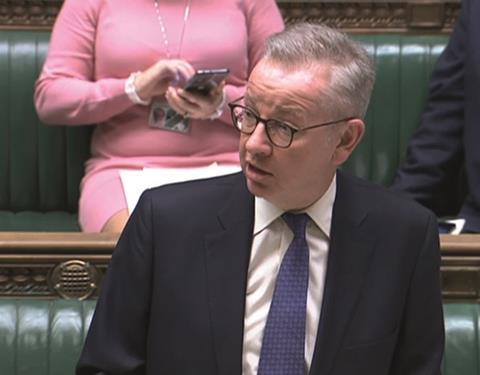Horsham and Teignbridge postpone meetings amid fears of ’complete collapse’ in plan-making
Two English councils have become the first to delay work on their local plans in light of Michael Gove’s bombshell planning reforms announced last week, amid fears of a big impact on housebuilding rates.
Both Horsham council in Sussex and Teignbridge Council in Devon have postponed council meetings scheduled for today that were due to consider the next stages of their respective local plans, citing Gove’s change of policy last week.

Gove last week set out a new approach to plan-making following pressure from backbench Tory MPs, which made clear that in future local housing need figures generated in Whitehall will be “advisory”, and that councils will be free to plan for fewer homes where space is constrained.
Gove set out a series of specific constraints, including the existing character of development, national parks, heritage restrictions, and areas of high flood risk, which would be allowed to excuse not meeting housing need, and made clear councils wouldn’t be expected to review their green belt boundaries to find housing sites.
The news from Horsham and Teignbridge comes after the Home Builders Federation predicted a “complete collapse” in local plan making in response to Gove’s announcement, in which he gave authorities a two year transitional period to adapt their housing proposals. The decisions follow similar decisions made by at least 20 authorities in the past year as uncertainty over the direction of travel on planning policy has grown.
>> See also Our leaders must stop weaponising targets and set a proper vision for planning
>> See also The Gove who stole Christmas: Why planning backdown will have a huge impact
>> See also Gove’s return could mean a fight with the housebuilders is on the cards
In a statement Horsham council, which in 2020 consulted on a controversial new local plan proposing up to 1,400 homes per year in the district, said a planned cabinet meeting had been “postponed”, citing the December 5 statement by Gove in the House of Commons. It said: “They [the government] have stated that whilst Government Housing Targets will remain, these will be a starting point for plan making with new flexibilities in place to reflect local circumstances. […]
“Given the critical stage in plan making reached by Horsham District Council, it has been decided to delay the Cabinet meeting programmed for the 15 December to consider the Local Plan in order to ensure that these proposals and any implications they may have can be given due consideration.”
The district said a new timetable for the local plan would be provided “in due course”. Work on Horsham’s local plan had already been seriously delayed by the nutrient neutrality crisis, with plan work postponed in 2021 while the council prepared a Water Neutrality Mitigation Strategy.
Horsham’s council leader, Cllr Jonathan Chowen told local newspaper Sussex World that he “welcomed the Government’s new approach” to the “unacceptable” housing targets for our District. “We particularly welcome the opportunity to reduce housing numbers in our current plan to those that are sustainable in our water stressed area,” he said.
According to Horsham’s Local Development Scheme, the council had been due to launch the next phase of its local plan consultation, a so-called “regulation 19” consultation, in “early 2023”.
Similarly, Teignbridge council said in a statement that a full council meeting due to consider a draft plan for regulation 19 consultation had been postponed. Teignbridge had been proposing building 741 homes a year, against stiff local opposition.
The council statement said: “This meeting has been postponed until Thursday 12 January 2023, following the announcement by the Secretary of State for Levelling Up, Housing and Communities, Michael Gove MP, regarding proposed changes to the Levelling Up and Regeneration Bill relating to housebuilding targets. Officers will review the details of the proposed changes and identify any implications for the Local Plan that members need to be aware of before they discuss the recommendation to approve the Proposed Submission Local Plan for public consultation”.
The news that Gove’s concessions to Tory rebels is already hitting local plan progress comes as the government successfully avoided rebellions as it steered the Levelling Up and Regeneration Bill through the House of Commons on Tuesday. Housing minister Lucy Frazer managed to secure support for all the government amendments, including proposals designed to increase developer build out rates.
Backbench rebels led by Theresa Villiers withdrew their proposed amendments to the Bill having secured assurances from Michael Gove that their concerns will be addressed in the new National Planning Policy Framework, due out for consultation before Christmas. Villiers said in the debate that Gove’s change of direction was “a victory for all of us who have been trying to do everything we can to safeguard our green and pleasant land and to protect the quality of life of the constituents we are privileged to represent.”

However, former secretary of state under Liz Truss, Simon Clarke said in the debate he was concerned about the direction of travel. He said: “It is critical that, as the national planning policy framework is redrawn, we keep making the case for good, high-quality developments with the right infrastructure and rational incentives for communities to welcome new homes.
“If we do not, it will be a social and economic disaster for this country and a terrible problem for my party as we seek to make the case for a property-owning democracy and popular capitalism.”
Labour’s shadow housing minister, Matthew Pennycook, said the Bill was “a real missed opportunity to enact the kind of planning reform that is required to meet the multiple challenges that we face as a country: to tackle the housing crisis, to respond to the climate emergency, to address our rapidly degrading natural environment, and to better promote health and wellbeing.”
The Home Builders Federation has already said that an effective removal of housebuilding targets is likely to reduce housebuilding rates by anything up to 100,000 homes per year as councils rein in the number of homes they plan for.











No comments yet